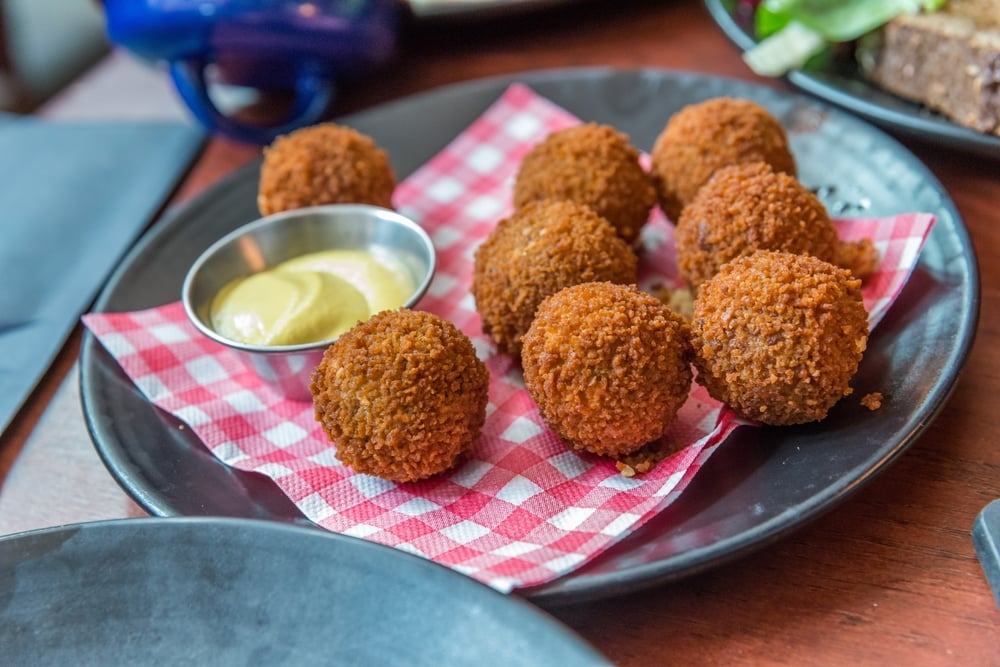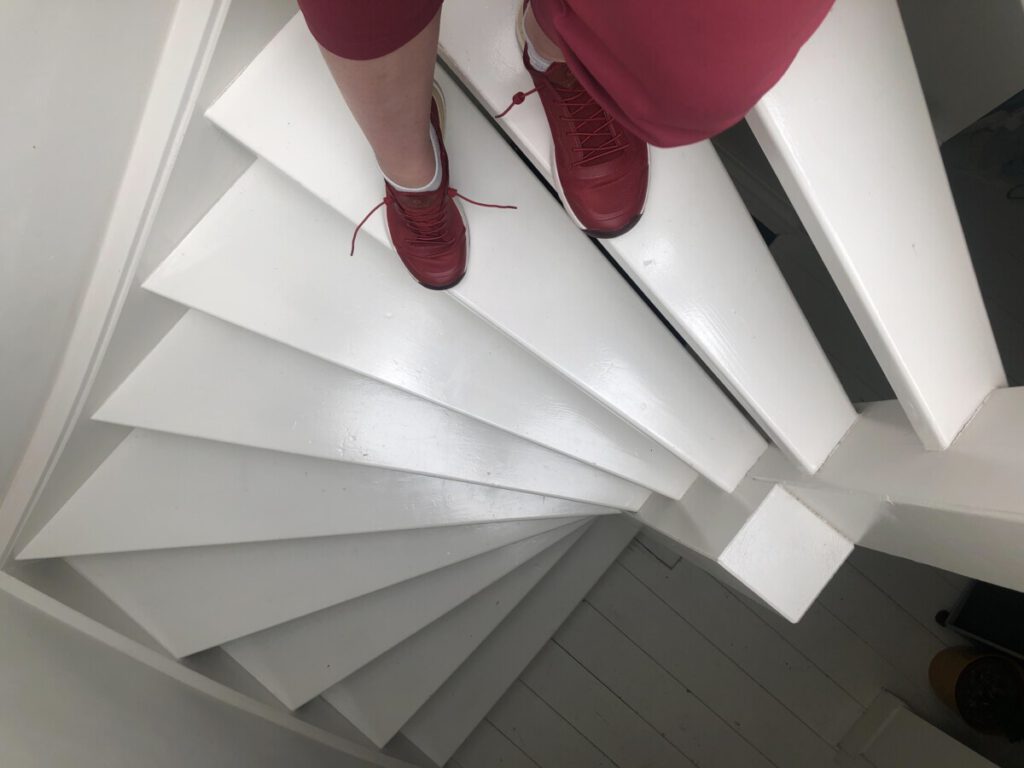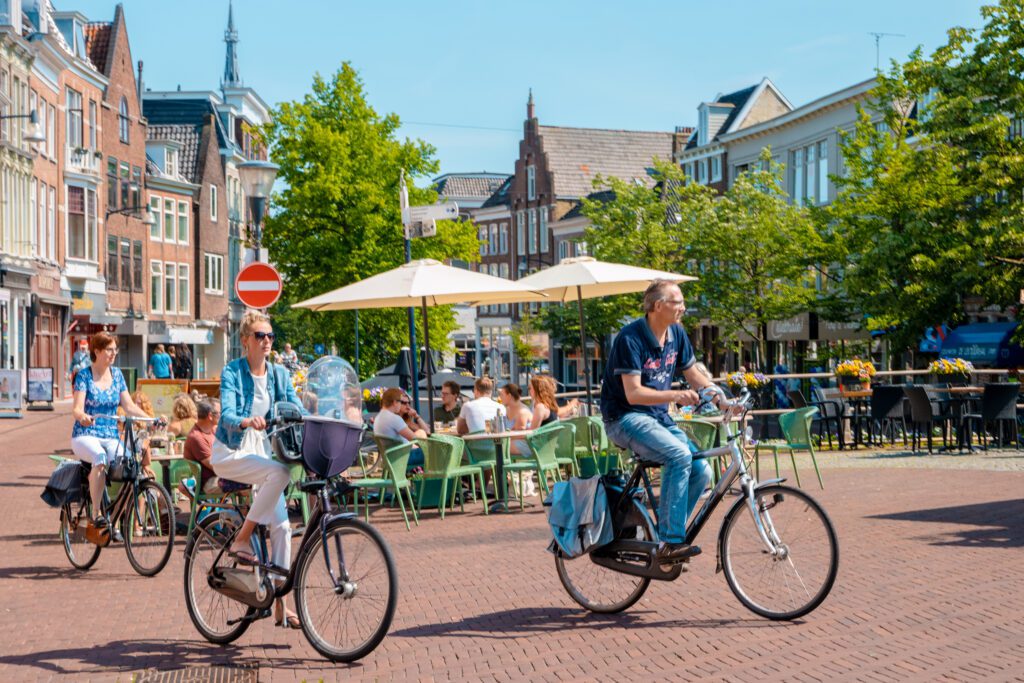Dutch expressions can sound pretty crazy when you translate them into English. So we thought we’d have some fun explaining our top 10 Dutch sayings to you!
I was at the gym and heard a woman say helaas pindakaas. It was just so confusing, as I knew what helaas (unfortunately) meant and I knew what pindakaas (peanut butter) meant. Why would these be together? 🤔
Keep reading if you’d like to avoid the confusion I had to deal with that day (and many months after)!
Alsof er een engeltje over je tong piest
Direct English translation: “As if an angel pisses on your tongue.”
You can use this one the first time you’re asked, “What do you think about bitterballen?” or “Have you had stamppot yet? How was it?”. This answer is a guaranteed crowd-pleaser if the crowd is Dutch.

This Dutch expression means you very much enjoyed your food. Even if that’s untrue, be nice — it doesn’t cost a thing. 😉
Just make sure not to order a stamppot again — but keep ordering bitterballen. They are heel lekker (very tasty)!
Met de deur in huis vallen
Direct English translation: “To fall with the door into the house.”
If you’re new to the Netherlands, you will soon hear about Dutch directness. Dutchies don’t mess around and won’t waste any time on your feelings or self-confidence.
Thick skin is a must, and it has to be built if it ain’t there. Practice with your friends, because throwing insults at each other is the best way to maintain friendships.
You will know you have mastered this Dutch expression when, at the Monday morning meeting, you open with “Harry, you look terrible and have been under-performing for weeks” instead of “Good morning, everyone!”
Ben je van de trap gevallen?
Direct English translation: “Did you fall down the stairs?”
Given their extreme stair builds, it seems like a perfectly normal thing to say in the Netherlands.

However, stairs have nothing to do with it, as “ben je van de trap gevallen” is an appropriate Dutch expression when someone just got a haircut. Preferably, a pretty drastic one, not just a trim.
The original expression was hij is van de trap gevallen en heeft zijn haar gebroken — he fell down the stairs and broke his hair.
Where is the logic to this expression? We don’t know, but we’ll go with it!
Wie boter op zijn hoofd heeft, moet uit de zon blijven
Direct English translation: “He who has butter on his head should stay out of the sun.”
Here are two important lessons for all of us kids:
- If you do, in fact, have butter on your head — wipe it off. That’s really weird.
- You should not judge others if you have your faults. Arguably, an even better lesson than number one — but I’m not sure.
This Dutch expression is comparable to the English counterpart: “people in glass houses should not throw stones”, meaning that those with obvious flaws shouldn’t draw attention to other people’s imperfections.
Een klap van de molen krijgen
Direct English translation: “To have been hit by the windmill.”
This phrase includes the most Dutch thing I’ve probably ever heard — although helaas pindakaas is up there.
This Dutch expression refers to acting dumb or crazy, and it’s pretty self-explanatory. It’s the opposite of doe normaal (which you should always do, by the way).

It’s probably something appropriate to tell your Dutch colleagues if you spot them having something warm for lunch — but hey, don’t quote me.
Als haringen in een ton zitten
Direct English translation: “To sit like herrings in a barrel.”
This is the perfect phrase for when you’re about to get on public transport during rush hour — or in Amsterdam, ever.
I imagine herrings in a barrel are uncomfortable, smell bad, and are probably dead. You will most probably feel the same, while you’re packed in a train carriage full of other people.
(Oké, you may still be alive, but you may wish you weren’t for a moment there. 👀)
Nu komt de aap uit de mouw
Direct English translation: “Now the monkey comes out of the sleeve.”
This expression refers to the way you reveal a secret without intending to do so, the same way a cat comes out of the bag in English.

As mentioned before in this article, (and probably in any other you’ll ever read about the Dutch?), people from the Netherlands are direct — and they don’t give a damn about it.
However, if Jan ever tells you he’s busy at work, and you spot him on the terrace with Marijke, you know what to say.
De kaas van je brood laten eten
Direct English translation: “To let the cheese on your bread be eaten.”
Now, if you’ve ever seen a typical Dutch lunch, it consists of 2 very important ingredients: bread and cheese. Obviously, the best part of this sophisticated meal is the cheese.
Letting someone else eat it means you’re probably too generous, which brings us to the real meaning of this expression: don’t let other people take advantage of you.
Eén zwaluw maakt nog geen zomer
Direct English translation: “One swallow doesn’t make summer.”
(FYI: we’re talking about the bird, not the throat action, friends. 😉)

This is a flexible one when it comes to Dutch expressions, and it refers to the fact that you generally need more than one clue to conclude that something’s true.
Feel free to add that 2, 3, 4 — or even 100 swallows don’t make summer since it’s usually true. God only knows what makes summer in the Netherlands last.
Dutch expressions: Je lult uit je nek
Direct English translation: “You’re d*cking out of your neck.”
No, not ducking. That’s right, we’re finishing in style.
Sometimes shortened to only je lult, this graceful Dutch expression means you’re calling out someone’s bullshit. The longer version is usually used to refer to a more serious spread of misinformation, especially on purpose.
The short version, however, is used in all sorts of contexts, even if you want to say “no way”, “can’t be true”, “can’t believe it”, and so on.
Till the next time, doe lekker normaal and speak like a pro-Dutchie!
What’s the weirdest Dutch phrase you have ever come across? Ever been left stunned by weird translations? Tell us in the comments!





How about “ondergedoken”? My parents “dived under” in Amsterdam during World War II and survived Nazi extermination. Why not “hidden” (verborgen, perhaps?) — Lisa
Not sure how to spell it, but my Great-grandmother used to say “a-yoo parapluie”. I think it was a sort of a greeting? Perhaps it was a variation of “adieu”? Never made sense to me.
As to Dutch directness, in the mid-70s, my family was visiting our Dutch relatives, staying with my grandmother in Amsterdam. My father was wearing some hip striped jeans, in the style of the day. A woman called down to him from an upper balcony, “Meneer, heeft U Uw pajamabroek aan?” (“Sir, are you wearing your pajama pants?”) His response, “Gaat U niks aan, hoor.” (“Look, it’s none of your business.”) As an American teenager, I was astounded!
Almost correct, Madeline. It’s ‘aju paraplu’.
It means goodbye, but in a way that’s not necessarily friendly.
In fact it ís a variation of ‘adieu’, brought here during the Napoleonic time.
I’m dutch and the saying you’re referring to is ‘ajuu paraplu’, same as with ‘helaas pindakaas’, the only reason these words are spoken together is just because they rhyme.. that’s it.. it’s like saying: “see you later, alligator” while there is hardly ever an alligator involved (besides from the fact that alligators have a non-existent grasp of the English language so saying it to one would be quite moronic).
A small backgroud addition to the one about who one swallow doesn’t make it summer yet:
As the temperature goes up, so does air pressure change. It causes insects to fly around at a particular level in the sky. Swallows like to come out for feeding, and fly around at that same level in the sky to eat the insects.
So at the start of summer, you’re more likely to see swallows just drifting around in the sky. And just because you’ve seen one, doesn’t mean summer is around the corner – that’s just one bird flying around. 🙂
ALS me me kond ver Randy Moët me op de blaren zitten. Meaning,
If your burn your bum you have to sit on the blisters.
This is often used if you made a blunder. And people warned you beforehand.
ALS me me kond ver Randy Moët me op de blaren zitten?!?
“Als je je kont verbrand moet je op de blaren zitten.” That’s how it is written.
When you burn your hiney you’ll have to sit on the blisters. Basically, when you screw up you’ll have to face the concequences
Shortly after we emigrated to the US, the Dutch CEO of the company took to the stage and gave one of the worst speeches I’ve ever heard. The audience was mostly American with a few of us Dutchies. And then he actually said, “Because you never know how a cow catches a rabbit!”. Not even the correct translation of “Je weet nooit hoe een koe een haas vangt.” And he smiled broadly, expecting laughter but instead he got blank stares from the Americans. We felt SO embarrassed…
Ben je van de trap gevallen?
Can’t say for certain sinds ik ben een buitenlander, but if this is a relatively new expression…
I see an awful lot of Dutch men absolutely drenched in hair gel. Sometimes, it’s so much that the hair looks like it has the tensile strength of a schuurspons and would probably shatter like a giant frozen snowflake if you fell down some stairs. 🙂
Iemand de kast op jagen – chasing someone up the cupboard.
English: to drive someone up the wall.
Slapen als een roosje (sleeping like a rose) equivalent: sleeping like a log